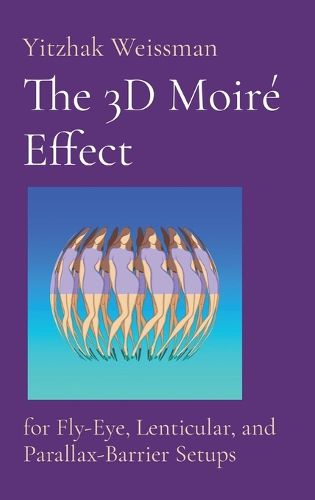Readings Newsletter
Become a Readings Member to make your shopping experience even easier.
Sign in or sign up for free!
You’re not far away from qualifying for FREE standard shipping within Australia
You’ve qualified for FREE standard shipping within Australia
The cart is loading…






This title is printed to order. This book may have been self-published. If so, we cannot guarantee the quality of the content. In the main most books will have gone through the editing process however some may not. We therefore suggest that you be aware of this before ordering this book. If in doubt check either the author or publisher’s details as we are unable to accept any returns unless they are faulty. Please contact us if you have any questions.
The 3D moire effect creates an impressive 3D illusion that doesn't require any visual aids to observe. Although it has been known for a while, it has recently gained more attention due to advancements in printing technologies that allow for commercial and artistic exploration.
Initially, it was used to produce images of floating planes. Gradually, it has been discovered that the surface can be sculpted into various forms, like a hemisphere, which has opened up new applications and increased interest in the effect.
This book explains the theoretical foundations of the 3D moire effect and how to sculpt the display into different surface geometries. It provides numerical and analytical methods for the computation of the image-warping transformation involved in the sculpting process. The book is based on original and hitherto unpublished research. It explores two types of 3D moire assemblies: optical and parallax-barrier. The optical category offers superior imaging and visual qualities and involves optical micro-lens arrays like lenticular and fly-eye sheets. The parallax barrier assembly is made from purely mechanical components.
Throughout the analysis, several new concepts are presented, which might require considerable effort from the reader to grasp. To make the process easier, the matter is unveiled gradually, step by step. Firstly, moire setups that exhibit floating planes are thoroughly analyzed. Then, the sculpting theory is introduced to generalize the floating planes scenario. To aid in comprehension, numerous figures and examples are
utilized in the text to guide the reader.
It's important to note that creating 3D moire pictures requires both theoretical knowledge and specific software and production processes, so readers looking to learn that skill may not find what they're looking for in this book. However, for those interested in exploring the topic on a theoretical level or writing software for 3D moire applications, this book is a valuable resource.
The concluding chapters briefly discuss the relation of 3D moire setups with 3D lenticular and fly-eye pictures and the new concept of 3D moire optics.
$9.00 standard shipping within Australia
FREE standard shipping within Australia for orders over $100.00
Express & International shipping calculated at checkout
This title is printed to order. This book may have been self-published. If so, we cannot guarantee the quality of the content. In the main most books will have gone through the editing process however some may not. We therefore suggest that you be aware of this before ordering this book. If in doubt check either the author or publisher’s details as we are unable to accept any returns unless they are faulty. Please contact us if you have any questions.
The 3D moire effect creates an impressive 3D illusion that doesn't require any visual aids to observe. Although it has been known for a while, it has recently gained more attention due to advancements in printing technologies that allow for commercial and artistic exploration.
Initially, it was used to produce images of floating planes. Gradually, it has been discovered that the surface can be sculpted into various forms, like a hemisphere, which has opened up new applications and increased interest in the effect.
This book explains the theoretical foundations of the 3D moire effect and how to sculpt the display into different surface geometries. It provides numerical and analytical methods for the computation of the image-warping transformation involved in the sculpting process. The book is based on original and hitherto unpublished research. It explores two types of 3D moire assemblies: optical and parallax-barrier. The optical category offers superior imaging and visual qualities and involves optical micro-lens arrays like lenticular and fly-eye sheets. The parallax barrier assembly is made from purely mechanical components.
Throughout the analysis, several new concepts are presented, which might require considerable effort from the reader to grasp. To make the process easier, the matter is unveiled gradually, step by step. Firstly, moire setups that exhibit floating planes are thoroughly analyzed. Then, the sculpting theory is introduced to generalize the floating planes scenario. To aid in comprehension, numerous figures and examples are
utilized in the text to guide the reader.
It's important to note that creating 3D moire pictures requires both theoretical knowledge and specific software and production processes, so readers looking to learn that skill may not find what they're looking for in this book. However, for those interested in exploring the topic on a theoretical level or writing software for 3D moire applications, this book is a valuable resource.
The concluding chapters briefly discuss the relation of 3D moire setups with 3D lenticular and fly-eye pictures and the new concept of 3D moire optics.